Featured
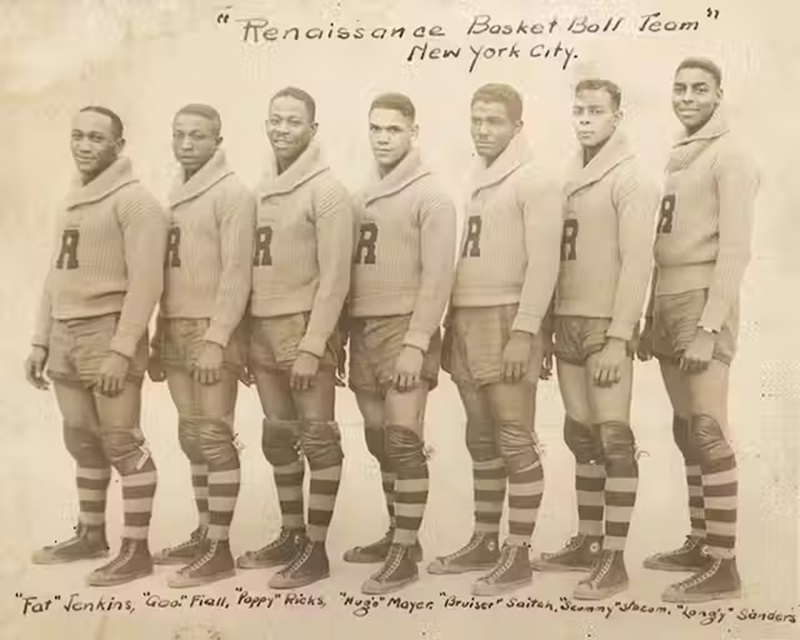 A century ago, a Black-owned team ruled basketball − today, no Black majority owners remain. By Jared Bahir Browah / The Conversation
A century ago, a Black-owned team ruled basketball − today, no Black majority owners remain. By Jared Bahir Browah / The Conversation
For the first time in 20 years, the NBA began its season with no Black-owned franchises.
This lack of diversity in basketball team ownership is especially disappointing considering the rich history of Black ownership in sports, which began when the top leagues in the U.S. were still segregated. A century ago, one of the top pre-NBA professional franchises began play in Harlem thanks to the efforts of a Black business owner named Bob Douglas.
The team played its first game as the Renaissance on Nov. 3, 1923, with Douglas signing his players to full-season contracts.
Two years later, the “Rens,” as they came to be called, were declared the World Colored Basketball Champions. The squad went on to establish itself as a national powerhouse and competed in some of the first professional basketball games between white teams and Black teams. In 1925, the Rens bested the Original Celtics, a white team from Manhattan’s West Side that many viewed as the top team in the nation. Read more
Political / Social
 Will courts ban Trump? Why Colorado case may keep him off 2024 ballot. Laurence H. Tribe and Dennis Aftergut / USA Today
Will courts ban Trump? Why Colorado case may keep him off 2024 ballot. Laurence H. Tribe and Dennis Aftergut / USA Today
To allow Donald Trump to appear on the 2024 presidential ballot, the courts will need to explain why any ruling that keeps the former president in the running doesn’t itself betray the Constitution.
A trial that began Monday in Colorado and legal arguments scheduled for Thursday in the Minnesota Supreme Court will test Donald Trump’s eligibility to serve as president. Both cases raise a monumental question that only the U.S. Supreme Court will ultimately be able to decide: Will we retain the Constitution under which we’ve governed ourselves for 234 years by ensuring that the awesome power of the presidency is never entrusted to someone who will not abide by the verdict of our nation’s laws for election or reelection to that office? Read more
Related: Trump’s channeling Hitler for protection. By Chauncey Devega / Salon
 MAGA Mike Johnson Once Warned About Dangers of Living Under Democracy. By Ellie Quinlan Houghtaling / The New Republic
MAGA Mike Johnson Once Warned About Dangers of Living Under Democracy. By Ellie Quinlan Houghtaling / The New Republic
Republicans’ new House speaker tried to warn people about why democracy isn’t actually good.
The contents of his evangelical musings—which he apparently wants to hide—offer revealing details about the little-known congressman, including that he doesn’t really believe in democracy. “By the way, the United States is not a democracy. Do you know what a democracy is? Two wolves and a sheep deciding what’s for dinner. You don’t want to be in a democracy. Majority rule: not always a good thing,” Johnson said at the First Baptist Church of Haughton, Louisiana, in 2019. Read more
 Biden hits another milestone for Black female judicial nominees. By Garren Keith Gaynor / The Grio
Biden hits another milestone for Black female judicial nominees. By Garren Keith Gaynor / The Grio
President Joe Biden announced two more Black female judicial nominees on Tuesday, Judges Julie S. Sneed and Jacquelyn D. Austin to serve as district court judges in the Deep South.
To date, 32 Black women appointed by Biden have been confirmed by the Senate to lifetime judgeships. Benjamin, who is also a senior adviser to the president, noted that the number of Black female federal judges is “more than any single administration in history.” Read more
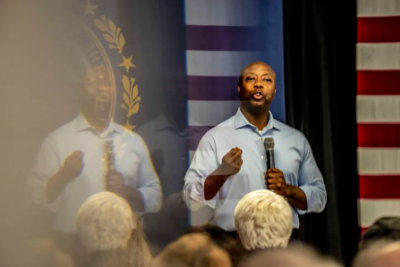 Tim Scott’s Racial Absolution. By Robert Samuels / The New Yorker
Tim Scott’s Racial Absolution. By Robert Samuels / The New Yorker
The senator from South Carolina presents an early electoral victory—he became president of his high school, years after a “race riot”—as a tidy tale of prejudice overcome. Is that the full story?
On the Presidential-campaign trail, Tim Scott often concludes his speeches with a declaration against dependence: Able-bodied people should work. Those who owe loans should pay them. The country needs more victors than victims. This summer, at an event in Des Moines, an audience of largely white evangelical voters applauded him heartily as he made his way offstage. Read more
 What It Takes for a Democrat to Be Competitive in the Deep Red South. By Tim Miller / The Bulwark
What It Takes for a Democrat to Be Competitive in the Deep Red South. By Tim Miller / The Bulwark
Last week the Democratic Governors Association (DGA) released an internal poll that showed Presley just one point behind incumbent governor Tate Reeves.
So let’s break down these three main elements that brought Presley’s campaign to where it stands today. Number one is Presley’s bio. To get Republican voters in Mississippi to open their ears to your candidacy, you have to have some tie that binds. Something to give you credibility. The second element: Combating Republican ads by demonstrating an independence from the national party on hot-button issues. Here’s where the final element comes in. The Republican opponent has to make mistakes. Bad mistakes. Read more
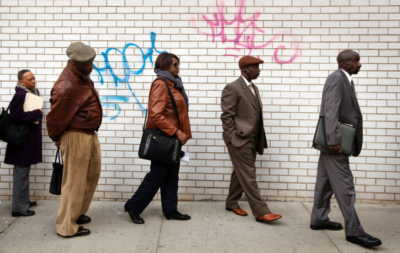 White Americans have far more wealth than Black Americans. Here’s how big the gap is. By Tami Luhby / CNN
White Americans have far more wealth than Black Americans. Here’s how big the gap is. By Tami Luhby / CNN
Although Black and Hispanic Americans have accumulated more wealth in recent years, their median net worth still lags far behind that of White Americans.
The net worth of the typical Black and Hispanic household in 2022 was $44,900 and about $61,600, respectively, according to the Federal Reserve’s latest Survey on Consumer Finances, a triennial report released this month that provides a comprehensive look at Americans’ financial circumstances. That’s up more than 61% for Black households and 47% for Hispanic households since the Fed’s last survey in 2019. Even with these gains, their wealth remains only a fraction of that of White households, whose median wealth was $285,000 last year, up 31% from 2019. Read more
 Report: Black imprisonment rates drop 70 percent for women, 48 percent for men since 2000. By The Grio Staff
Report: Black imprisonment rates drop 70 percent for women, 48 percent for men since 2000. By The Grio Staff
Black imprisonment rates have dropped significantly since 2000.
While incarceration rates in the United States increased by 700 percent between the 1970s and the early 2000s, The 19th News reported that a recent analysis from advocacy organization The Sentencing Project found that from 2000 to 2021, the imprisonment rate declined by a whopping 70 percent for Black women and 48 percent for Black males. In comparison, Latinas witnessed an 18 percent reduction, Latinos had a 34 percent decline, white women saw a 12 percent increase, and white males saw a 27 percent decrease. Read more
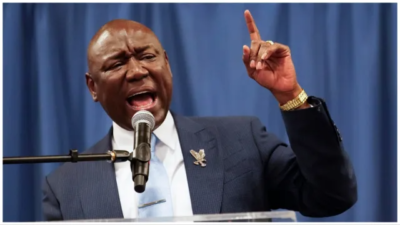 Ben Crump calls for federal investigation into Mississippi police handling of Dexter Wade’s death. By Cheyanne M. Daniels / The Hill
Ben Crump calls for federal investigation into Mississippi police handling of Dexter Wade’s death. By Cheyanne M. Daniels / The Hill
Civil rights attorney Ben Crump is calling on the Department of Justice to investigate the handling of Dexter Wade’s death in Mississippi.
Wade, a 37-year-old Black man, died after being run over by a police officer in March. He was buried without his mother’s knowledge and she was not informed of his death until six months later, despite the coroner having identified Wade and his next of kin at the time of his autopsy. Read more
 White patients are more likely than Black patients to be given opioid medication for pain in US emergency departments. By Trevor Thompson and Sofia Stahl / The Conversation
White patients are more likely than Black patients to be given opioid medication for pain in US emergency departments. By Trevor Thompson and Sofia Stahl / The Conversation
White people who visit hospital emergency departments with pain are 26% more likely than Black people to be given opioid pain medications such as morphine.
This was a key finding from our recent study, published in the Journal of General Internal Medicine. We also found that Black patients were 25% more likely than white patients to be given only non-opioid painkillers such as ibuprofen, which are typically available over the counter. Read more
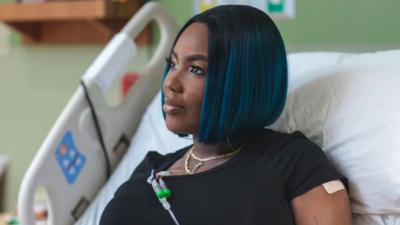 A new cure for sickle cell disease may be coming. FDA advisers will review it next week. By The AP and NBC News
A new cure for sickle cell disease may be coming. FDA advisers will review it next week. By The AP and NBC News
The only cure for painful sickle cell disease today is a bone marrow transplant. But soon there may be a new cure that attacks the disorder at its genetic source.
On Tuesday, advisers to the Food and Drug Administration will review a gene therapy for the inherited blood disorder, which in the U.S. mostly affects Black people. Issues they will consider include whether more research is needed into possible unintended consequences of the treatment. Read more
 The Native American population exploded, the census shows. Here’s why. By Andrew Van Dam / Wash Post
The Native American population exploded, the census shows. Here’s why. By Andrew Van Dam / Wash Post
The report provides the most detailed data we’ve ever had on America’s racial and ethnic origins, including stunningly exhaustive data on nearly 1,200 tribes, native villages and other entities. We hoped it would shed light on one of the biggest mysteries in the 2020 Census: Why did the Native American population skyrocket by 85 percent over the past decade?
The number of Americans claiming Indigenous heritage jumped from 5.2 million in 2010 to 9.6 million in 2020, a stark increase that probably was not the result of good old-fashioned procreation. Native Americans had the lowest fertility rate of any group measured last year, roughly tied with Asian Americans, according to the U.S. Centers for Disease Control and Prevention. We could make some less-than-educated guesses, informed by the observation that the rise was largest among Native Americans claiming a mixed heritage. Read more
Ethics / Morality / Religion
 The evangelical Christian activist who is now speaker of the House. By Mark Silk / RNS
The evangelical Christian activist who is now speaker of the House. By Mark Silk / RNS
Does Mike Johnson’s Bible-based worldview stop at the border?
For his part, Johnson, 51, ascended to the speakership from the far reaches of House leadership as one of Congress’ leading religious conservatives. A Southern Baptist, he went to work as a young attorney for the Alliance Defense Fund (now Alliance Defending Freedom), fighting that legal outfit’s rear-guard action against gay rights and same-sex marriage through the 2000s. Read more
Related: Christian Nationalism ‘Is No Longer Operating Beneath the Surface.’ By Thomas B. Edsall / NYT
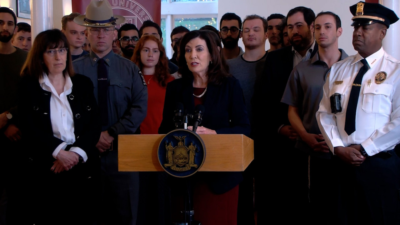 Colleges under pressure to address antisemitism on campuses. By Madina Toure’ / Politico
Colleges under pressure to address antisemitism on campuses. By Madina Toure’ / Politico
The strife has been pronounced on college campuses, with students and staff warning of feeling unsafe and clashing with administrators and protestors.
Governors and political leaders in states are starting to press colleges to take more steps to quell antisemitism amid a surge due to the Israel-Hamas war. Gov. Kathy Hochul (shown) on Monday vowed to protect Jewish students from antisemitism following online threats at Cornell University — the latest in a string of incidents that prompted some officials to threaten to take away funding for colleges that do not step up anti-hate enforcement. Read more
Related: Biden administration unveils actions to combat antisemitism on college campuses. By and
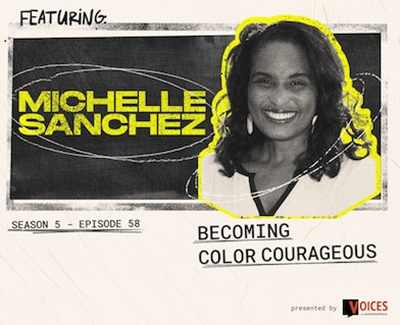 ‘Becoming Color Courageous’ with Michelle Sanchez. By Rasool Berry / Christianity Today Podcast
‘Becoming Color Courageous’ with Michelle Sanchez. By Rasool Berry / Christianity Today Podcast
A gifted leader in evangelism and spiritual formation, Michelle Sanchez discovered that matters of racial equity and inclusion are also essential to healthy discipleship.
Michelle Sanchez always expected perfection. Growing up, that expectation guided her to great success. Yet God had a much greater plan for her in mind; a plan that required a journey of untangling her toxic pursuit of perfection from the racial dynamics of her past. Today that journey has led her to become a voice for change and fueled her passion for using discipleship to help heal racial inequalities and build a beautifully diverse and beloved community in a nation (and world) fractured by division and distrust. Read more and listen here
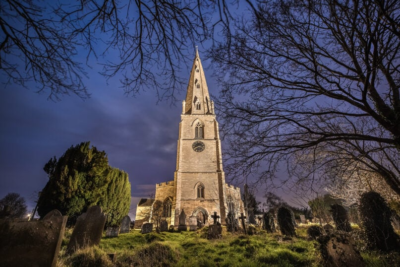 250 years later, ‘Amazing Grace’ has filled churches, concerts, even commercials. By Adelle M. Banks / RNS
250 years later, ‘Amazing Grace’ has filled churches, concerts, even commercials. By Adelle M. Banks / RNS
Says author James Walvin: ‘its words speak to a human condition of suffering, and people coming out of suffering, and its music has a kind of haunting refrain that soothes.’
James Walvin, a former Church of England choirboy and professor of history at the University of York, doesn’t remember encountering “Amazing Grace,” in song or in his hymnal. It wasn’t until he traveled to the United States to research the history of slavery that he came upon the hymn introduced by John Newton, a former slave trader, in 1773. Since then, Walvin, the author of the new book “Amazing Grace: A Cultural History of the Beloved Hymn,” has submerged himself in the hymn, which turns 250 this year and has become a staple of Sunday services that has been adapted and adopted by preachers, performers and presidents. Read more
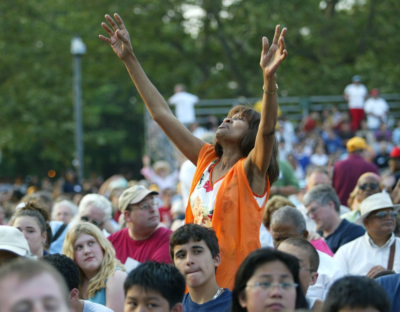 Why Black People Believe the End is Near. By Benjamin Baker / AAIHS
Why Black People Believe the End is Near. By Benjamin Baker / AAIHS
Recently Pew Research Center released the results of a study on “How Religion Intersects with Americans’ Views on the Environment.” In it, more than 10,000 U.S. adults demographically representing the nation responded to an online survey of several dozen questions. A few of the questions touched on beliefs about the end of the world. The results are important.
In response to the question, “Do you believe we are living in the end times,” 76% of Black Christians said Yes, and 68% of all Black Americans said Yes. This means that 3 out of 4 Black Christians, and almost 7 out of 10 of all Black people, believe the end is near. When asked, “Do you believe Jesus will return to Earth someday,” 86% of Black Christians responded Yes, and 77% of all Black people said Yes. Read more
Historical / Cultural
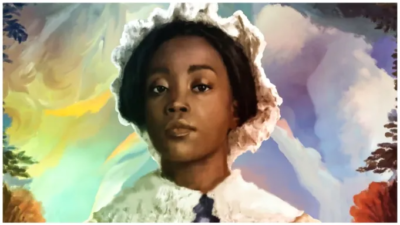 ‘Stamped From the Beginning’ Examines Racism and White Supremacy in Documentary From Roger Ross Williams. By Jazz Tangcay / Variety
‘Stamped From the Beginning’ Examines Racism and White Supremacy in Documentary From Roger Ross Williams. By Jazz Tangcay / Variety
Netflix has released the trailer for “Stamped From the Beginning,” a hybrid documentary and scripted feature that delves into race in the United States.
Roger Ross Williams (“The Apollo,” “Life Animated”) directs Ibram X. Kendi’s book adaptation of the same name. ‘Stamped From the Beginning’ streams on Netflix on Nov. 20. Read more and watch the trailer.
Related: People of African descent still face discrimination and attacks: UN. By Edith M. Lederer / ABC News
 This course uses big data to examine how American newspapers covered lynchings. By Rob Wells / The Conversation
This course uses big data to examine how American newspapers covered lynchings. By Rob Wells / The Conversation
One of my students was reviewing a spreadsheet that listed total lynchings by state. She exhaled, and then, with a bit of weariness, said, “Mississippi, goddamn.”
She was trying to comprehend the enormity of violence against the Black population of Mississippi: 823 lynchings from 1865 to 2011, according to the Tolnay-Beck and Seguin lynching inventories, two of the main academic resources in this field. She is one of 13 University of Maryland journalism students digging through historic newspaper articles and data tables this semester to learn about how U.S. newspapers covered lynching. Read more
 The Original Black Girl Magic: Meet The Black Woman Who Ignited The Salem Witch Trials. By Rayna Reid Rayford / Essence
The Original Black Girl Magic: Meet The Black Woman Who Ignited The Salem Witch Trials. By Rayna Reid Rayford / Essence
In 1692, Tituba Indian, and enslaved woman, became one of the first people accused of practicing witchcraft
So who was Tituba? Much of what we know about her comes from the infamous testimony she provided to the court. Records have pieced together that Tituba was an enslaved woman from the West Indians. It is believed that her surname comes from her marriage to John Indian who was also enslaved. Read more
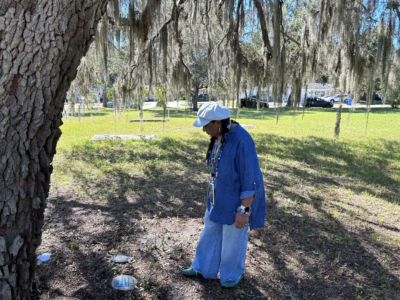 The Sacred Ground Where Black Americans Search for Their Roots. By Margo Snipe / Capital B
The Sacred Ground Where Black Americans Search for Their Roots. By Margo Snipe / Capital B
In many ways, Tampa Bay, Florida is ground zero for the nationwide battle to preserve Black cemeteries. Two of Jacqueline Hayes’ grandparents are buried at Whispering Souls African American Cemetery in Clearwater, Florida. (Margo Snipe/Capital B)
Exactly where the bodies lie underneath Jacqueline Hayes’ feet on the acre of land at 2698 South Drive is somewhat of a riddle waiting to be solved. Most of the graves are unmarked, and although published obituaries name some of those buried at the site, it’s impossible to know precisely where. Still, Hayes was admiring what she could see above ground during a visit on a Friday in October. Scattered across were aged headstones and a jigsaw puzzle of memories. The exact number of marked graves was unclear. But just 5 miles away in Tampa, another battle continues to brew. The segregation-era St. Matthews Baptist Church’s graveyard has been paved over, leaving ancestors suffocating underneath the parking lot of a corporation’s headquarters. The company is now battling with the city over whose responsibility it is to move the graves, an endeavor that will likely cost millions. Read more
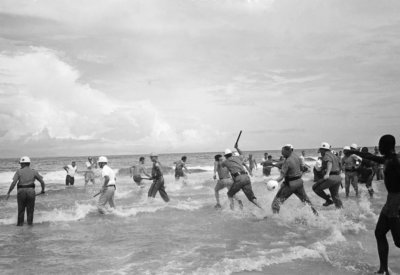 Using Horror to Explore Florida’s Ignored Civil Rights Movement. By Brandon Tensley / Capital B
Using Horror to Explore Florida’s Ignored Civil Rights Movement. By Brandon Tensley / Capital B
Tananarive Due’s “The Reformatory” sheds light on the terrors that were visited on Black Americans in Jim Crow Florida. Florida state police run into the surf at St. Augustine Beach following an attack by white segregationists on Black Americans attempting to swim at the beach in June 1964. (Bill Hudson/Associated Press)
The Reformatory contains elements of horror, but it also is an engrossing piece of historical fiction. Released on Tuesday, the book sheds light on the atrocities that were visited on Black Americans in the Jim Crow South. And it does this at a moment when conservative parents and lawmakers around the country continue their push to banish from schools and public libraries all titles that grapple with race and racism — think Beloved, Toni Morrison’s Pulitzer Prize-winning 1987 novel about a family of formerly enslaved people who are haunted by a ghost. Read more
 Latino voices on family, sports, legacy, music, tradition and language. By Betty Chavarria, David Betancourt, Samantha Schmidt, Emmanuel Martinez, Lucio Villa, Maite Fernández Simon, Arelis R. Hernández and Katty Huertas / Wash Post
Latino voices on family, sports, legacy, music, tradition and language. By Betty Chavarria, David Betancourt, Samantha Schmidt, Emmanuel Martinez, Lucio Villa, Maite Fernández Simon, Arelis R. Hernández and Katty Huertas / Wash Post
The richness of Latino culture as presented through six short essays by staffers at The Washington Post
In one case, a writer describes how the decision by a couple to leave their home country in favor of the United States has influenced the cultural awareness of their descendants. Like so many people through so many generations from so many places, they sought a better life and planted seeds of tradition for those who would come later. We invite you to read these six essays and perhaps connect with some of the experiences found within Latino culture. Read more
Sports
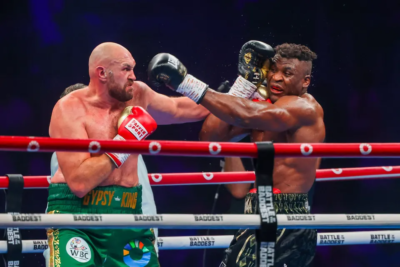 How Francis Ngannou Shocked the Boxing World. By Kele Sanneh / The New Yorker
How Francis Ngannou Shocked the Boxing World. By Kele Sanneh / The New Yorker
The M.M.A. fighter lost his first professional boxing match, against the heavyweight champion Tyson Fury. He was still the hero of the night.
The conventional wisdom is that pitting a boxer against an M.M.A. fighter will generally produce a predictable outcome: the M.M.A. fighter would win an M.M.A. fight, where wrestling and kicks are allowed (indeed, encouraged), but the boxer would win a boxing match just as easily, because M.M.A. fighters are generalists—punching is merely one of many skills they must master. In the moments after the fight, Fury gave Ngannou some credit, saying, “He was a lot better than we thought he’d be.” Read more
 ESPN’s Stephen A. Smith had a chance to stand up to the NFL. Instead, he capitulated. By Mike Freeman / USA Today
ESPN’s Stephen A. Smith had a chance to stand up to the NFL. Instead, he capitulated. By Mike Freeman / USA Today
He’s become so influential that like Pat McAfee and a handful of others, his power must be examined and chronicled. People with that kind of power must look internally at how they wield it. Apparently, that’s not what Smith (or McAfee) does. What Smith allegedly said to Trotter, who is fighting a significant battle against the NFL that Trotter says discriminated against him was, frankly, shameful.
The backdrop: Last month Trotter filed a lawsuit against the NFL alleging discrimination and retaliation after his contract wasn’t renewed following Trotter twice challenging Commissioner Roger Goodell about the lack of diversity inside the NFL Media newsroom. Read more
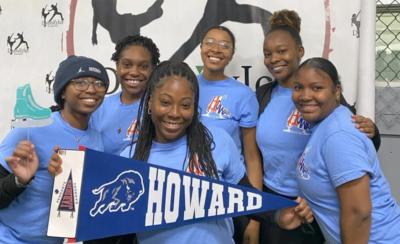 Howard University Now Has The First HBCU Figure Skating Team In The Country. By Melissa Noel / Essence
Howard University Now Has The First HBCU Figure Skating Team In The Country. By Melissa Noel / Essence
The history-making team was founded by Maya James and Cheyenne Walker, two Howard University students who have been involved in the sport since childhood and longed to get back on the ice, U.S. Figure Skating reports.
Getting the club approved by Howard and U.S. Figure Skating was a challenging task, as they had to convince the university to fund the club and to embrace ice skating, which is not a Division I sport. That process took a full semester, but by the summer of 2023, Howard University’s figure skating team was officially formed, becoming the first intercollegiate team in the history of an HBCU. Read more
Site Information
Articles appearing in the Digest are archived on our home page. And at the top of this page register your email to receive notification of new editions of Race Inquiry Digest.
Click here for earlier Digests. The site is searchable by name or topic. See “search” at the top of this page.
About Race Inquiry and Race Inquiry Digest. The Digest is published on Mondays and Thursdays.
Use the customized buttons below to share the Digest in an email, or post to your Facebook, Linkedin or Twitter accounts.